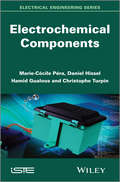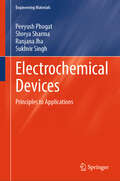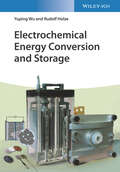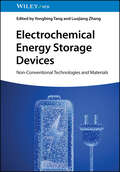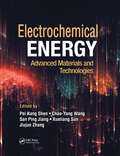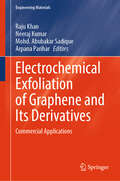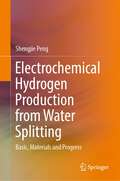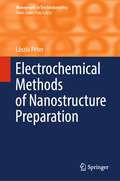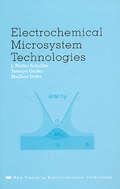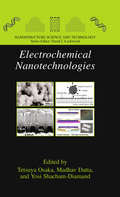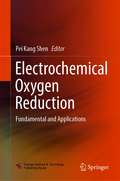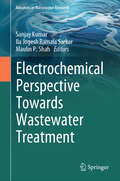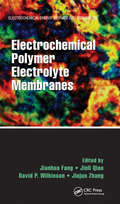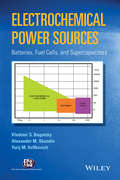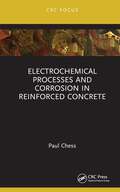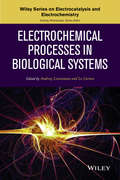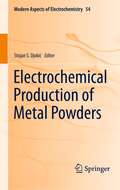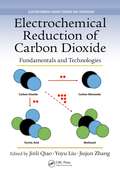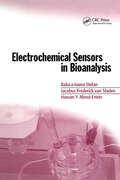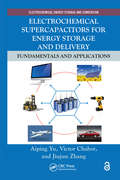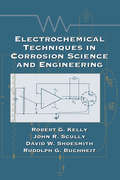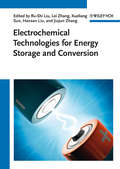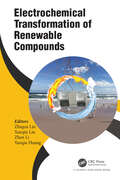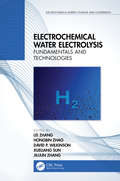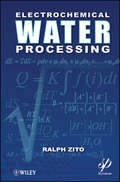- Table View
- List View
Electrochemical Components
by Marie-Cécile PéraThis book focuses on the methods of storage commonly used in hybrid systems. After an introductory chapter reviewing the basics of electrochemistry, Chapter 2 is given over to the storage of electricity in the form of hydrogen. Once hydrogen has been made, we have to be able to convert it back into electricity on demand. This can be done with another energy converter: a fuel cell, the subject of Chapter 3. Such a system is unable to deliver significant dynamics in terms of storage and release of electricity and needs to be supplemented with another solution: a detailed study of supercapacitors is provided in Chapter 4.While the storage systems touched upon in the previous three chapters (hydrogen batteries and supercapacitors) both exhibit advantageous characteristics, at present they are still relatively costly. Thus, the days of the electrochemical accumulator by no means appear to be numbered just yet. This will therefore be the topic of Chapter 5. Finally, on the basis of the elements laid down in the previous chapters, Chapter 6 will focus on electrical hybridization of these storage systems, with a view to enhancing the performance (in terms of energy, lifetime, cost, etc.) of the newly formed system. Aimed at an audience of researchers, industrialists, academics, teachers and students, many exercises, along with corrected solutions, are provided throughout the book. Contents 1. Basic Concepts of Electrochemistry used in Electrical Engineering. 2. Water Electrolyzers. 3. Fuel Cells. 4. Electrical Energy Storage by Supercapacitors. 5. Electrochemical Accumulators. 6. Hybrid Electrical System. About the Authors Marie-Cécile Péra is a Full Professor at the University of Franche-Comte in France and Deputy Director of the FEMTO-ST Institute (CNRS). Her research activities include modeling, control and diagnosis of electric power generation systems (fuel cells – PEMFC and SOFC, supercapacities, batteries) for transportation and stationary applications. She has contributed to more than 180 articles in international journals and conferences. Daniel Hissel is Full Professor at the University of Franche-Comte in France and Director of the Fuel Cell Lab Research Federation (CNRS). He also leads a research team devoted to hybrid electrical systems in the FEMTO-ST Institute (CNRS). He has published more than 250 research papers on modeling, control, diagnostics and prognostics of hybrid electrical systems. Hamid Gualous is Full Professor at the University of Caen Lower Normandy in France and director of the LUSAC laboratory. His current research interests include power electronics, electric energy storage, power and energy systems and energy management. Christophe Turpin is Full Researcher at the CNRS (French National Center for Scientific Research). He is responsible for hydrogen activities within the Laboratory LAPLACE, Toulouse, France. His research activities include the characterization and modeling of fuel cells and electrolyzers, the state of health of these components, and their hybridization with other electrochemical components (ultracapacitors, batteries) within optimized energy systems for stationary and aeronautical applications.
Electrochemical Devices: Principles to Applications (Engineering Materials)
by Peeyush Phogat Shreya Sharma Ranjana Jha Sukhvir SinghThis book serves as a comprehensive guide for both beginners and researchers, offering insights into the diverse array of electrochemical devices and their intricate dependencies. It provides a comprehensive overview of electrochemical devices from fundamental principles to cutting-edge applications. By bringing together insights from materials science, chemistry, physics, engineering, and beyond, it offers a holistic understanding of the underlying mechanisms, design strategies, and practical considerations associated with these devices. The book begins by exploring of the fundamental principles of electrochemistry, laying the groundwork for understanding electrochemical reactions, charge transfer processes, and device operation mechanisms. Building upon this foundation, it delves into various types of electrochemical devices, including solar cells, photodetectors, sensors, batteries, and more.
Electrochemical Energy Conversion and Storage
by Rudolf Holze Yuping WuThis pioneering textbook on the topic provides a clear and well-structured description of the fundamental chemistry involved in these systems, as well as an excellent overview of the real-life practical applications. Prof. Holze is a well-known researcher and an experienced author who guides the reader with his didactic style, and readers can test their understanding with questions and answers throughout the text. Written mainly for advanced students in chemistry, physics, materials science, electrical engineering and mechanical engineering, this text is equally a valuable resource for scientists and engineers working in the field, both in academia and industry.
Electrochemical Energy Storage Devices: Non-Conventional Technologies and Materials
by Yongbing Tang Luojiang ZhangSystematic and insightful overview of various novel energy storage devices beyond alkali metal ion batteries for academic and industry Electrochemical Energy Storage Devices delivers a comprehensive review of promising energy storage devices with the potential for higher energy and power density, longer lifetime cycle, better safety performance, and lower costs and environmental footprint compared to traditional lithium-ion batteries. The book covers the fundamentals of energy storage devices and key materials (cathode, anode, and electrolyte) and discusses advanced characterization techniques to allow for further improvement of their electrochemical performance. Current challenges and future outlooks in the field are also discussed. Written by a highly qualified academic with significant research experience in the field, Electrochemical Energy Storage Devices includes information on sample topics including: Mechanisms and promising cathode catalysts for metal air batteries and mechanisms and advanced materials for metal-CO2 batteries Magnesium-based and other types of multivalent-ion batteries and M/N/C catalysts for fuel cells Developments and prospects of aqueous batteries and progress and perspectives of material design and engineering in flow batteries Rechargeable lithium-sulfur batteries, dual-ion batteries, hybrid capacitors, and flexible energy storage devices Explaining working mechanisms and laying the groundwork for innovative optimization strategies, Electrochemical Energy Storage Devices is an essential reference on the subject for materials scientists and chemists.
Electrochemical Energy: Advanced Materials and Technologies (Electrochemical Energy Storage and Conversion)
by Chao-Yang Wang Jiujun Zhang Xueliang Sun San Ping Jiang Pei Kang ShenElectrochemical Energy: Advanced Materials and Technologies covers the development of advanced materials and technologies for electrochemical energy conversion and storage. The book was created by participants of the International Conference on Electrochemical Materials and Technologies for Clean Sustainable Energy (ICES-2013) held in Guangzhou, China, and incorporates select papers presented at the conference. More than 300 attendees from across the globe participated in ICES-2013 and gave presentations in six major themes: Fuel cells and hydrogen energy Lithium batteries and advanced secondary batteries Green energy for a clean environment Photo-Electrocatalysis Supercapacitors Electrochemical clean energy applications and markets Comprised of eight sections, this book includes 25 chapters featuring highlights from the conference and covering every facet of synthesis, characterization, and performance evaluation of the advanced materials for electrochemical energy. It thoroughly describes electrochemical energy conversion and storage technologies such as batteries, fuel cells, supercapacitors, hydrogen generation, and their associated materials. The book contains a number of topics that include electrochemical processes, materials, components, assembly and manufacturing, and degradation mechanisms. It also addresses challenges related to cost and performance, provides varying perspectives, and emphasizes existing and emerging solutions. The result of a conference encouraging enhanced research collaboration among members of the electrochemical energy community, Electrochemical Energy: Advanced Materials and Technologies is dedicated to the development of advanced materials and technologies for electrochemical energy conversion and storage and details the technologies, current achievements, and future directions in the field.
Electrochemical Exfoliation of Graphene and Its Derivatives: Commercial Applications (Engineering Materials)
by Neeraj Kumar Raju Khan Arpana Parihar Mohd. Abubakar SadiqueThe book describes the technique of electrochemical exfoliation, which possesses remarkable ability to bring about transformation. Among various known synthesis methods, the electrochemical exfoliation approach eliminates the use of harsh chemicals and energy-intensive methods commonly linked to the synthesis of graphene. Electrochemical exfoliation utilizes electrical energy to gently remove layers of graphene from its original source, providing a more environmentally friendly method. This precise and careful synchronization heralds a new era in the field of materials science, where the principles of sustainability converge with unmatched performance. Moreover, the benefits extend beyond environmental excellence. This book also examines the complexities of electrochemical exfoliation, highlighting its clear advantage over traditional techniques. The approach demonstrates process in manipulating the structure and properties of graphene, allowing for the customization of specific capabilities to suit a wide range of applications.
Electrochemical Hydrogen Production from Water Splitting: Basic, Materials and Progress
by Shengjie PengThis book provides a systematic and comprehensive introduction to the fundamentals of hydrogen energy, hydrogen energy-related technologies and systems, and the environmental and economic impacts of hydrogen energy. This book is rich in content, combining theory with practice and reflecting the latest world achievements in hydrogen energy utilization and research. It is used by a wide range of scientific and technologists engaged in the development and utilization of hydrogen energy and other energy sources. It is also referenced for technical workers in power engineering, aerospace, chemistry, chemical engineering, refrigeration, metallurgy, and those engaged in safety management, as well as for teachers and students of related disciplines in higher education institutions. Furthermore, this book makes some modest contribution to the development of hydrogen energy by strengthening the hydrogen energy research teams.
Electrochemical Methods of Nanostructure Preparation (Monographs in Electrochemistry)
by László PéterThis book summarizes the electrochemical routes of nanostructure preparation in a systematic and didactic manner. It provides a comprehensive overview of electrodeposition, anodization, carbon nanotube preparation and other methods of nanostructure fabrication, combining essential information on the physical background of electrochemistry with materials science aspects of the field. The book includes a brief introduction to general electrochemistry with an emphasis on physico-chemical aspects, followed by a description of the sample preparation methods. In each chapter, an overview of the particular method is accompanied by a discussion of the relevant physical or chemical properties of the materials, including magnetic, mechanical, optical, catalytic, sensoric and other features. While some preparation methods are discussed in connection with the theories of physical electrochemistry (e.g. electrodeposition), the book also covers methods that are more heuristic but nonetheless utilize electric current (e.g. anodization of porous alumina or synthesis of carbon nanotubes by means of electric arc discharge).
Electrochemical Microsystem Technologies (New Trends in Electrochemical Technology)
by J.Walter Schultze, Tetsuya OsakaDriven by the electronics industry, electrochemical technology has rapidly evolved, finding increasing applications in microelectronics, batteries, sensors, materials science, industrial fabrication, corrosion, microbiology, neurobiology and medicine. Electrochemical Microsystem Technologies provides an overview of the technological status; the dev
Electrochemical Nanotechnologies
by Madhav Datta Yosi Shacham-Diamand Tetsuya OsakaIn this book, the term "electrochemical nanotechnology" is defined as nanoprocessing by means of electrochemical techniques. This introductory book reviews the application of electrochemical nanotechnologies with the aim of understanding their wider applicability in evolving nanoindustries. These advances have impacted microelectronics, sensors, materials science, and corrosion science, generating new fields of research that promote interaction between biology, medicine, and microelectronics. This volume reviews nanotechnology applications in selected high technology areas with particular emphasis on advances in such areas. Chapters are classified under four different headings: Nanotechnology for energy devices - Nanotechnology for magnetic storage devices - Nanotechnology for bio-chip applications - Nanotechnology for MEMS/Packaging.
Electrochemical Oxygen Reduction: Fundamental and Applications
by Pei Kang ShenThis book discusses systematically the theoretical research and the applications of electrochemical oxygen reduction. Oxygen reduction reaction is a common issue in electrochemistry, but is also an important process involved in the field of energy, cryogenic fuel cells, metal–air cells, oxygen sensors and hydrogen peroxide preparation. This book is divided into 6 chapters; it starts with a description of dynamic mechanisms, followed by a detailed introduction on the related experimental methods and related catalyst preparation technology. By providing the basic methods and testing techniques, and by demonstrating their applications, it helps readers gain a better understanding of oxygen reduction reactions, making it a valuable resource for the industrialization of scientific research achievements. Accordingly, the book appeals to a broad readership, particularly graduate students, those working at universities and research organizations, and industrial researchers.
Electrochemical Perspective Towards Wastewater Treatment (Advances in Wastewater Research)
by Sanjay Kumar Maulin P. Shah Ila Jogesh Ramala SarkarThis book presents electrochemical water treatment methods, which offer ways to find more sustainable solutions. The majority of electrochemical water treatment methods use electricity as the main reactant to conduct the treatment process. Among well-developed electrochemical water treatment methods such as electrocoagulation, electroflotation, electrodialysis, electrochemical oxidation-reduction, there are evolving methods, which show good pre fundamentals for their use in industry-scale applications. These methods increase the removal rates of pollutants, remove drawbacks, extend the applicability of existing electrochemical water treatment methods, and improve cost-efficiency. This book also delivers the improved and enhanced innovative techniques which are economical and efficient for wastewater treatment industry. In addition, the book will envisage the future potential of electrochemical treatment adaptation and a protocol for achieving graded water flexibility and a sustainable future. The main typical reactors used for electrochemical water treatment methods are discussed in this book. Moreover, the volume includes some examples of electrochemical water treatment methods in practice and the activities of some companies working in the field of water treatment. At the same time, design solutions for reactors of developing electrochemical processes are still in the stage of optimization and development, which are presented in the book. There is often a difficulty in selecting the right size of equipment for the treatment of water with given flow rates and concentration of pollutants. This book focuses on the challenges and future tendencies for this highly efficient technology to reach the full-scale implementations as well.
Electrochemical Polymer Electrolyte Membranes (ISSN)
by Jiujun Zhang David P. Wilkinson Jinli Qiao Jianhua FangElectrochemical Polymer Electrolyte Membranes covers PEMs from fundamentals to applications, describing their structure, properties, characterization, synthesis, and use in electrochemical energy storage and solar energy conversion technologies. Featuring chapters authored by leading experts from academia and industry, this authoritative text: Disc
Electrochemical Power Sources: Batteries, Fuel Cells, and Supercapacitors (The ECS Series of Texts and Monographs)
by Vladimir S. Bagotsky Alexander M. Skundin Yurij M. VolfkovichElectrochemical Power Sources (EPS) provides in a concise way the operational features, major types, and applications of batteries, fuel cells, and supercapacitors* Details the design, operational features, and applications of batteries, fuel cells, and supercapacitors* Covers improvements of existing EPSs and the development of new kinds of EPS as the results of intense R&D work* Provides outlook for future trends in fuel cells and batteries* Covers the most typical battery types, fuel cells and supercapacitors; such as zinc-carbon batteries, alkaline manganese dioxide batteries, mercury-zinc cells, lead-acid batteries, cadmium storage batteries, silver-zinc batteries and modern lithium batteries
Electrochemical Processes and Corrosion in Reinforced Concrete
by Paul ChessSome reinforced concrete structures prematurely corrode as they age, with significant financial implications, but it is not immediately clear why some are more durable than others. This book looks at the various mechanisms for corrosion and how what seemed to be a relatively simple matter has become more complex the further it is understood due to the properties of concrete, steel and the way reinforced concrete structures are constructed. The significance of electrochemical processes is identified with recent research using new technology discussed. Specialist contractors, consultants and owners of corrosion damaged structures will find this an extremely useful resource. It will also be a valuable reference for students at postgraduate level.
Electrochemical Processes in Biological Systems
by Andrzej Wieckowski Andrzej Lewenstam Lo GortonThe first book to provdie a comprehensive look at bioenergetics, the energy flow in living systems, by studying ion exchange and electron transfer processes in biological membranes and artificial bio-films, and how these processes contribute to developing modern biosensor and ion-sensor technology, as well as biofuel cells. The book: Discusses the ion fluxes and electron transfer processes in biological membranes and artificial bio-films Provides an in-depth description of the processes at the interface between the membrane/film and substrate electrode Is the first of its kind to provide a comprehensive look at how these processes are understood in biology of living cells Addresses how these processes contribute to developing modern biosensor and ion-sensor technology, as well as biofuel cells
Electrochemical Production of Metal Powders
by Stojan S. DjokićThis new volume of Modern Aspects of Electrochemistry reviews different methods for the production of metal powders including mechanical, chemical and electrochemical powders. Electrochemically produced metal powders are of high purity and they are extremely active during sintering. These powders find a wide-range of applications in automotive, aerospace, energy device and electronics industries.
Electrochemical Reduction of Carbon Dioxide: Fundamentals and Technologies (Electrochemical Energy Storage And Conversion Ser. #11)
by Jiujun Zhang Jinli Qiao Yuyu LiuFor Researchers, Students, Industrial Professionals, and ManufacturersElectrochemical Reduction of Carbon Dioxide: Fundamentals and Technologies is your guide to improved catalytic performance in the electrochemical reduction of carbon dioxide (CO2). Written by electrochemical energy scientists actively involved in environmental research and develo
Electrochemical Sensors in Bioanalysis
by Raluca-Ioana Stefan"Covers the most recent methods and materials for the construction, validation, analysis, and design of electrochemical sensors for bioanalytical, clinical, and pharmaceutical applications--emphasizing the latest classes of enantioselective electrochemical sensors as well as electrochemical sensors for in vivo and in vitro diagnosis, for DNA assay
Electrochemical Supercapacitors for Energy Storage and Delivery: Fundamentals and Applications (Electrochemical Energy Storage and Conversion #1)
by Jiujun Zhang Aiping Yu Victor ChabotAlthough recognized as an important component of all energy storage and conversion technologies, electrochemical supercapacitators (ES) still face development challenges in order to reach their full potential. A thorough examination of development in the technology during the past decade, Electrochemical Supercapacitors for Energy Storage and Delivery: Fundamentals and Applications provides a comprehensive introduction to the ES from technical and practical aspects and crystallization of the technology, detailing the basics of ES as well as its components and characterization techniques. The book illuminates the practical aspects of understanding and applying the technology within the industry and provides sufficient technical detail of newer materials being developed by experts in the field which may surface in the future. The book discusses the technical challenges and the practical limitations and their associated parameters in ES technology. It also covers the structure and options for device packaging and materials choices such as electrode materials, electrolyte, current collector, and sealants based on comparison of available data. Supplying an in depth understanding of the components, design, and characterization of electrochemical supercapacitors, the book has wide-ranging appeal to industry experts and those new to the field. It can be used as a reference to apply to current work and a resource to foster ideas for new devices that will further the technology as it becomes a larger part of main stream energy storage.
Electrochemical Techniques in Corrosion Science and Engineering (Corrosion Technology Ser. #Vol. 18)
by Rudolph G. Buchheit Robert G. Kelly John R. Scully David ShoesmithThis book describes the origin, use, and limitations of electrochemical phase diagrams, testing schemes for active, passive, and localized corrosion, the development and electrochemical characterization of passivity, and methods in process alteration, failure prediction, and materials selection. It offers useful guidelines for assessing the efficac
Electrochemical Technologies for Energy Storage and Conversion
by Lei Zhang Jiujun Zhang Hansan Liu Xueliang Sun Ru-Shi LiuIn this handbook and ready reference, editors and authors from academia and industry share their in-depth knowledge of known and novel materials, devices and technologies with the reader. The result is a comprehensive overview of electrochemical energy and conversion methods, including batteries, fuel cells, supercapacitors, hydrogen generation and storage as well as solar energy conversion. Each chapter addresses electrochemical processes, materials, components, degradation mechanisms, device assembly and manufacturing, while also discussing the challenges and perspectives for each energy storage device in question. In addition, two introductory chapters acquaint readers with the fundamentals of energy storage and conversion, and with the general engineering aspects of electrochemical devices. With its uniformly structured, self-contained chapters, this is ideal reading for entrants to the field as well as experienced researchers.
Electrochemical Transformation of Renewable Compounds
by Zhiqun Lin Zhen Li Xueqin Liu Yanqiu HuangElectrochemical conversion process can be used to generate power, store energy and synthesize chemicals, which plays a key role in the development of sustainable energy resources. Electrochemical Transformation of Renewable Compounds presents the basic fundamentals of different electrochemical transformations for clean energy and places significant emphasis on the key developments of various electrochemical processes using state-of-the-art materials. Written by electrochemical energy scientists who have worked on the application of electrocatalysis in the environmental and energy area, this book provides comprehensive coverage of main electrochemical transformation processes, including oxygen evolution, hydrogen generation, oxygen reduction, carbon dioxide reduction, nitrogen reduction, methanol oxidation, urea oxidation and ammonia oxidation.
Electrochemical Water Electrolysis: Fundamentals and Technologies (Electrochemical Energy Storage and Conversion)
by Lei Zhang Jiujun Zhang Xueliang Sun David P. Wilkinson Hongbin ZhaoThis book comprehensively describes the fundamentals of electrochemical water electrolysis as well as the latest materials and technological developments. It addresses a variety of topics such as electrochemical processes, materials, components, assembly and manufacturing, and degradation mechanisms, as well as challenges and strategies. It also includes an understanding of how materials and technologies for electrochemical water electrolysis have developed in recent years, and it describes the progress in improving performance and providing benefits to energy systems and applications. Features the most recent advances in electrochemical water electrolysis to produce hydrogen Discusses cutting-edge materials and technologies for electrochemical water electrolysis Includes both experimental and theoretical approaches that can be used to guide and promote materials as well as technological development for electrochemical water electrolysis Comprises work from international leading scientists active in electrochemical energy and environmental research and development Provides invaluable information that will benefit readers from both academia and industry With contributions from researchers at the top of their fields, the book includes in-depth discussions covering the engineering of components and applied devices, making this an essential read for scientists and engineers working in the development of electrochemical energy devices and related disciplines.
Electrochemical Water Processing: A Compendium Of Analyses And Laboratory Notes Based Upon R&d In Electrochemical Energy Systems Technology
by Ralph ZitoEven though most of the Earth’s surface is covered with water, most of it is not directly usable for human consumption or applications. As the population increases and our general style of living standards increase, the importance useable water is becoming acute. This book addresses this issue with approaches to treating water sources that require removal of unwanted or dissolved substances. In particular, it covers various methods for removing dissolved ionic materials. There are numerous methods for accomplishing this end, and the book reviews most of them in some depth.
